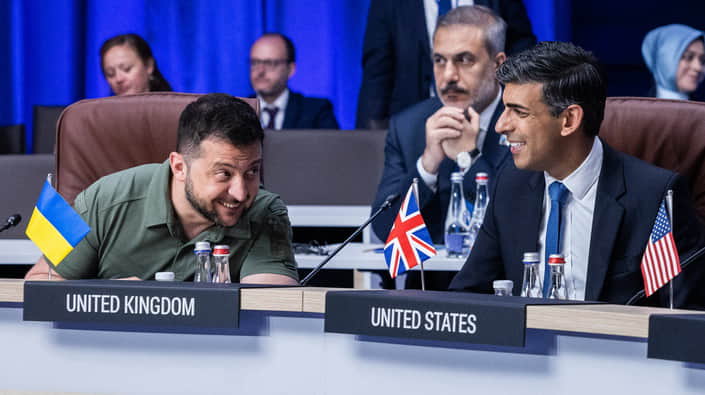"Security Guarantees" Pledged to Ukraine Would Leave Ukrainians Frustrated

Kyiv has inflated expectations from these agreements, and this is partly a linguistic problem. The English term "security guarantees" in a literal Ukrainian translation sounds as if other countries are providing a firm assurance that Ukraine will no longer face dangers. But that's not the case. The United States and Allies do not plan and cannot take any commitments of such a kind.
So, what can Ukraine actually obtain?
It pertains to limited assistance, the provision of weapons, and so on. This will contribute to security but will not guarantee it.
This difference in expectations is already evident – Kyiv and Washington refer to the future security commitments of the West using different terms. This may lead to false expectations in Ukraine, which could result in disappointment.
The "guarantees" from Vilnius for Ukraine:
On July 12, at the NATO summit, the heads of the United States, Canada, Japan, the United Kingdom, France, Germany, Italy, as well as leaders of the EU and the President of Ukraine, jointly announced the approval of a framework document titled "Joint Declaration on Support for Ukraine."
Technically, none of the leaders signed this decision; it was deliberately formulated as a political declaration with no legal force. This sped up the agreement on the document and simplified its joining. Any capital can declare that it supports the Vilnius Declaration.
The countries that Kyiv considers "guarantors" have undertaken a political commitment to sign "bilateral security commitments and agreements" with Ukraine, in which they will codify a legal obligation to assist Ukraine in countering Russian aggression.
Some of the signatories will guarantee the assistance with weaponry, including long-range artillery, aircraft, and air defence systems. They will also develop an action plan in the event of a new Russian attack once the current war has ended. This means that substantial commitments are involved.
However, despite its ambition, the "Vilnius Declaration" is merely a declaration of intentions. The actual results can only be assessed after the promised bilateral agreements are put into place. At that point, Kyiv may find that it did not obtain the "guarantees" it had hoped for.
The United States does not give "security guarantees"
The number of states becoming parties to the declaration is coming to 20. Kyiv aims at as broad support as possible, including engaging large South American countries. However, in military terms, the guarantees from only one country matter significantly – the United States.
Agreements with two other "NATO nuclear triad" states, the United Kingdom and France, will also be important, as they will look to Washington. The entire "nuclear triad" will serve as a reference for all other NATO members.
Therefore, the US is key, and Kyiv is well aware of this.
However, Kyiv and Washington already have differing approaches. While President Zelenskyy and the Ukrainian Ministry of Foreign Affairs speak of "security guarantees," the United States deliberately avoids using this term. You will not also find the word "guarantees" in the Vilnius document. The discrepancy in positions was evident in Vilnius, where Jake Sullivan responded to questions about security guarantees using the term "security commitments" at the NATO Public Forum.
This is not by mistake. The United States avoids providing "security guarantees" to anyone outside NATO. Even countries like Israel or Taiwan receive security assistance but not guarantees. It's hard to believe that Ukraine will have better terms.
Why are the agreements reached in Vilnius important for Ukraine?
Until legally binding documents are in place, it remains a declaration of intentions. However, there are reasons for optimism. The US Congress is bipartisan in its pro-Ukrainian stance, and Ukraine enjoys significant support in other countries.
Even partial "security commitments" (not security guarantees) will be beneficial for Ukraine.
They can ensure stability in the weaponry flow during changes in governments of the "guarantor" states. The specifics of the guarantees after the current war is over are also crucial.
The most important aspect to acknowledge is that there are no absolute legal security guarantees in the world. Modern states do not commit to providing military assistance in the event of an attack. This is how global security functions. Even the NATO treaty does not include a legal obligation to send armies to defend one another. It only commits members to offer assistance. However, NATO members have taken on political commitments to provide military assistance in addition to the legal documents. Thus, when it comes to the threat of direct aggression from Russia, NATO indeed offers the best defence to its members.
Therefore, the only truly effective guarantee against future Russian aggression is NATO membership. No bilateral agreements can replace Ukraine's path towards the Alliance.
It should be the foundation for all agreements.
Written by Sergiy Sydorenko
Editor, European Pravda
